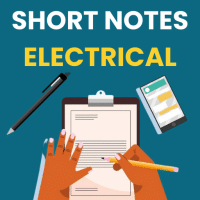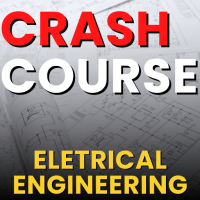Electrical Engineering (EE) Exam > Electrical Engineering (EE) Questions > At DC, capacitor acts as?a)Open circuitb)Shor...
Start Learning for Free
At DC, capacitor acts as?
- a)Open circuit
- b)Short circuit
- c)Resistor
- d)Inductor
Correct answer is option 'A'. Can you explain this answer?
Verified Answer
At DC, capacitor acts as?a)Open circuitb)Short circuitc)Resistord)Indu...
At DC, the inductor acts as short circuit because the capacitive resistance is infinity. The frequency of a DC circuit is 0. The capacitive resistance=1/(2*pi*f*C). Therefore, if the frequency is 0, the capacitive resistance is infinity and it acts as an open circuit.
Most Upvoted Answer
At DC, capacitor acts as?a)Open circuitb)Short circuitc)Resistord)Indu...
The correct answer is option 'A' - an open circuit.
Explanation:
A capacitor is an electrical component that stores and releases electrical energy. It consists of two conductive plates separated by an insulating material known as a dielectric. When a DC (direct current) voltage is applied across the capacitor, it charges up and stores energy in the form of an electric field between its plates.
In a DC circuit, the behavior of a capacitor can be explained by its charging and discharging characteristics. Let's discuss how a capacitor acts as an open circuit in a DC circuit.
Charging Phase:
- Initially, when a DC voltage is applied across a discharged capacitor, it behaves as an open circuit. This means that no current flows through the capacitor, and it blocks the flow of DC current through it.
- As the voltage is applied, the electric field starts building up between the capacitor plates. Electrons accumulate on one plate, creating a negative charge, while the other plate loses electrons, creating a positive charge.
- The charging process continues until the capacitor reaches its full charge, and the voltage across it becomes equal to the applied voltage. At this point, the capacitor behaves as an open circuit, blocking any DC current from flowing through it.
Discharging Phase:
- If the applied voltage is suddenly removed from the charged capacitor, it starts to discharge. During this phase, the stored energy in the capacitor is released.
- As the capacitor discharges, the electric field between the plates collapses, and the charges on the plates redistribute.
- Similar to the charging phase, the capacitor behaves as an open circuit during the discharging process. It blocks the flow of DC current, allowing only a transient current to flow as it discharges.
Conclusion:
In a DC circuit, a capacitor acts as an open circuit during both the charging and discharging phases. It blocks the flow of DC current while allowing the flow of transient current during the charging and discharging processes. This property of a capacitor makes it useful in various applications, such as energy storage, filtering, and timing circuits.
Explanation:
A capacitor is an electrical component that stores and releases electrical energy. It consists of two conductive plates separated by an insulating material known as a dielectric. When a DC (direct current) voltage is applied across the capacitor, it charges up and stores energy in the form of an electric field between its plates.
In a DC circuit, the behavior of a capacitor can be explained by its charging and discharging characteristics. Let's discuss how a capacitor acts as an open circuit in a DC circuit.
Charging Phase:
- Initially, when a DC voltage is applied across a discharged capacitor, it behaves as an open circuit. This means that no current flows through the capacitor, and it blocks the flow of DC current through it.
- As the voltage is applied, the electric field starts building up between the capacitor plates. Electrons accumulate on one plate, creating a negative charge, while the other plate loses electrons, creating a positive charge.
- The charging process continues until the capacitor reaches its full charge, and the voltage across it becomes equal to the applied voltage. At this point, the capacitor behaves as an open circuit, blocking any DC current from flowing through it.
Discharging Phase:
- If the applied voltage is suddenly removed from the charged capacitor, it starts to discharge. During this phase, the stored energy in the capacitor is released.
- As the capacitor discharges, the electric field between the plates collapses, and the charges on the plates redistribute.
- Similar to the charging phase, the capacitor behaves as an open circuit during the discharging process. It blocks the flow of DC current, allowing only a transient current to flow as it discharges.
Conclusion:
In a DC circuit, a capacitor acts as an open circuit during both the charging and discharging phases. It blocks the flow of DC current while allowing the flow of transient current during the charging and discharging processes. This property of a capacitor makes it useful in various applications, such as energy storage, filtering, and timing circuits.

|
Explore Courses for Electrical Engineering (EE) exam
|

|
Question Description
At DC, capacitor acts as?a)Open circuitb)Short circuitc)Resistord)InductorCorrect answer is option 'A'. Can you explain this answer? for Electrical Engineering (EE) 2025 is part of Electrical Engineering (EE) preparation. The Question and answers have been prepared according to the Electrical Engineering (EE) exam syllabus. Information about At DC, capacitor acts as?a)Open circuitb)Short circuitc)Resistord)InductorCorrect answer is option 'A'. Can you explain this answer? covers all topics & solutions for Electrical Engineering (EE) 2025 Exam. Find important definitions, questions, meanings, examples, exercises and tests below for At DC, capacitor acts as?a)Open circuitb)Short circuitc)Resistord)InductorCorrect answer is option 'A'. Can you explain this answer?.
At DC, capacitor acts as?a)Open circuitb)Short circuitc)Resistord)InductorCorrect answer is option 'A'. Can you explain this answer? for Electrical Engineering (EE) 2025 is part of Electrical Engineering (EE) preparation. The Question and answers have been prepared according to the Electrical Engineering (EE) exam syllabus. Information about At DC, capacitor acts as?a)Open circuitb)Short circuitc)Resistord)InductorCorrect answer is option 'A'. Can you explain this answer? covers all topics & solutions for Electrical Engineering (EE) 2025 Exam. Find important definitions, questions, meanings, examples, exercises and tests below for At DC, capacitor acts as?a)Open circuitb)Short circuitc)Resistord)InductorCorrect answer is option 'A'. Can you explain this answer?.
Solutions for At DC, capacitor acts as?a)Open circuitb)Short circuitc)Resistord)InductorCorrect answer is option 'A'. Can you explain this answer? in English & in Hindi are available as part of our courses for Electrical Engineering (EE).
Download more important topics, notes, lectures and mock test series for Electrical Engineering (EE) Exam by signing up for free.
Here you can find the meaning of At DC, capacitor acts as?a)Open circuitb)Short circuitc)Resistord)InductorCorrect answer is option 'A'. Can you explain this answer? defined & explained in the simplest way possible. Besides giving the explanation of
At DC, capacitor acts as?a)Open circuitb)Short circuitc)Resistord)InductorCorrect answer is option 'A'. Can you explain this answer?, a detailed solution for At DC, capacitor acts as?a)Open circuitb)Short circuitc)Resistord)InductorCorrect answer is option 'A'. Can you explain this answer? has been provided alongside types of At DC, capacitor acts as?a)Open circuitb)Short circuitc)Resistord)InductorCorrect answer is option 'A'. Can you explain this answer? theory, EduRev gives you an
ample number of questions to practice At DC, capacitor acts as?a)Open circuitb)Short circuitc)Resistord)InductorCorrect answer is option 'A'. Can you explain this answer? tests, examples and also practice Electrical Engineering (EE) tests.

|
Explore Courses for Electrical Engineering (EE) exam
|

|
Signup for Free!
Signup to see your scores go up within 7 days! Learn & Practice with 1000+ FREE Notes, Videos & Tests.


















